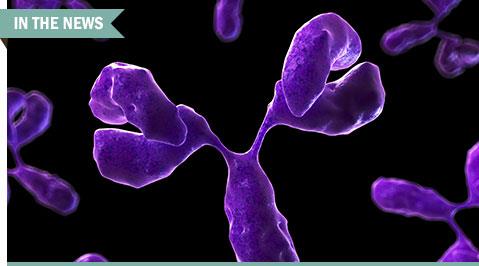 Image credit: Eraxion/Thinkstock
Image credit: Eraxion/Thinkstock
Two prominent researchers—Andrew Bradbury of the Bioscience Division at the Los Alamos National Laboratory in New Mexico and Andreas Plückthun of the University of Zurich in Switzerland—along with 110 co-signors have issued a call for standardizing antibodies in research. While pharmaceutical and biotech companies use “extremely reliable” antibodies in their research, that does not translate well to research done elsewhere, making it difficult if not impossible for other researchers to replicate what these companies have shown in preclinical studies. This in turn costs an estimated $350 million annually in wasted time and materials, according to the authors.
A 2008 study found that “fewer than half of around 6,000 routinely used commercial antibodies recognized only their specified targets, with some manufacturers producing consistently good antibodies, and others consistently poor ones”—and that number may be optimistic, the authors wrote. “In fact, we believe that poorly characterized and ill-defined antibodies were in large part to blame for a study co-authored by C. Glenn Begley (a co-signatory to this article) being able to replicate the scientific results of only six of 53 landmark preclinical studies.”
The authors propose an international collaboration and funding initiative to define all binding reagents to help curb the money being lost. “Crucially, researchers should use recombinant antibodies or binding reagents. These are made from reliable cell lines by isolating and incorporating the genes into plasmid DNA and transferring the plasmids into cells or bacteria for culture,” they advised.
Pharmaceutical and biotechnology companies have entire departments dedicated to validating and characterizing antibodies, which may explain why their findings differ from those of other researchers. “Consequently the reagents used in most clinical trials and especially in medical procedures cleared by the US Food and Drug Administration or the European Medicines Agency are extremely reliable,” the authors wrote. “Outside clinical trials, reagents are rarely validated to the same degree. What is more, only 44% of publications provide enough information—for instance, on the supplier—for researchers to be able to purchase the same antibody. The quality of the documentation that accompanies batches (such as on functionality in different assays) is enormously variable; even when it is provided, it may not correspond to the batch supplied.”
Correcting this issue will likely require two steps, the authors suggested. “First, the sequences should be obtained for widely used hybridoma-produced monoclonal antibodies. These antibodies should thence be produced recombinantly,” the authors wrote. “Second, the research community should turn to methods that directly yield recombinant binding reagents that can be sequenced and expressed easily. These include display and two-hybrid methods—in which the best binders are selected from billions.”
With current technology, the authors estimate it could cost about $1 billion to “generate characterized recombinant binding reagents to target the primary products of all 20,000 human genes.” Still, this is less than what they estimate is currently wasted worldwide on bad reagents in a 2-year period, and they predict the money will be recouped over time due to more reproducible data.